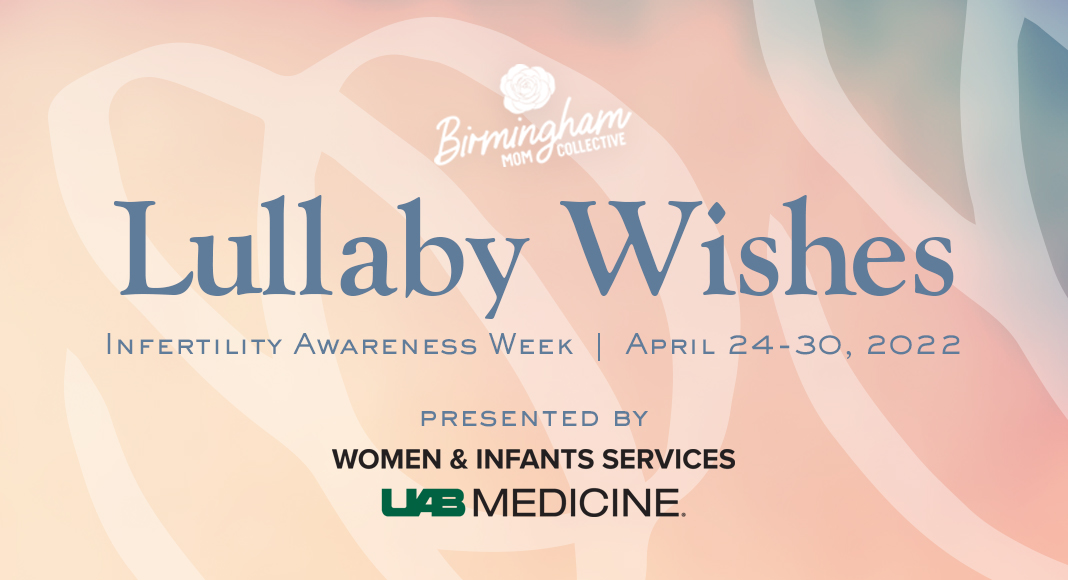 Today marks the start of National Infertility Awareness Week and the beginning of our annual “Lullaby Wishes” series. Infertility affects one in eight couples in the US, and while no two paths are the same, it is typically a challenging process, to say the least. As in years past, we have partnered with UAB Women & Infants Services to shed light on an issue that touches so many women and families. Over the next several days, we will share information, stories, and words of encouragement in an effort to increase awareness. We will also provide helpful resources. Most of all, we will let our fellow moms and longing-to-be moms know that they are not alone. Today, we are thrilled to begin our series with a Q&A with Drs. Sukhkamal Campbell and Deidre Gunn, both Reproductive Endocrinologists and Infertility Specialists at UAB.
Today marks the start of National Infertility Awareness Week and the beginning of our annual “Lullaby Wishes” series. Infertility affects one in eight couples in the US, and while no two paths are the same, it is typically a challenging process, to say the least. As in years past, we have partnered with UAB Women & Infants Services to shed light on an issue that touches so many women and families. Over the next several days, we will share information, stories, and words of encouragement in an effort to increase awareness. We will also provide helpful resources. Most of all, we will let our fellow moms and longing-to-be moms know that they are not alone. Today, we are thrilled to begin our series with a Q&A with Drs. Sukhkamal Campbell and Deidre Gunn, both Reproductive Endocrinologists and Infertility Specialists at UAB.
How do you define infertility?
For women under 35 years of age, infertility is defined as trying to conceive for 12 months with regular cycles and exposure to sperm. For those over 35 years, the time-frame is six months instead of one year.
At what point should someone seek medical care for fertility issues?
While there are set definitions of infertility, I encourage my patients to pursue a fertility workup for a variety of reasons, including the following:
- you have a known condition that may make it challenging to conceive such as polycystic ovarian syndrome or premature menopause
- you have a genetic condition for which you are considering IVF with genetic testing of embryos (PGT-A and/or PGT-M)
- you’re not yet trying to conceive but you are curious about your future reproductive potential
Many of our patients are also interested in pursuing pregnancy using donor gametes (donor eggs, donor sperm, and/or donor embryos) or by using a gestational carrier (surrogate). Those considerations are also reasons to see a fertility specialist. Even though there are strict definitions of infertility, it can be better to undergo an evaluation prior to reaching that point.
Is infertility hereditary?
Certain conditions may run in families, such as genetic conditions that cause premature menopause/premature ovarian failure, endometriosis, fibroids, and polycystic ovarian syndrome (PCOS). These can all be causes of infertility in patients.
What are the primary causes of infertility?
The most common causes of infertility typically involve the uterus, tubes, ovaries, and/or sperm. Further description of such issues include ovulatory disorders (polycystic ovarian syndrome being one of the most likely), tubal disorders (history of tubal ligation, damaged tubes from prior infections or endometriosis), uterine factors (fibroids, polyps, mullerian anomalies like duplicated uteruses, intrauterine scar tissue from prior losses), and male factors (low sperm counts or abnormal sperm parameters on a semen analysis).
What is the first step for someone seeking medical help?
The first step is making the appointment to see a fertility specialist and completing a thorough history with that physician. At your first visit we will discuss fertility goals as well as obtain a complete patient history. We will discuss topics such as menstrual history, prior pregnancies, prior fertility therapies, prior surgeries, and medication history. Based on this initial visit and patient goals, the next step will likely be imaging (ultrasound or hysterosalpingogram), lab work to assess fertility hormones (thyroid function, ovarian reserve testing), and discussion of sperm source (potential semen analysis for patients with male partners or discussing donor sperm sources).
What treatment options do you offer for someone dealing with infertility?
We choose treatments tailored to the patient’s specific source of infertility. We usually start with more conservative therapies, such as oral agents to induce ovulation (clomiphene citrate or letrozole). Sometimes this is paired with timed intercourse, and sometimes it’s paired with intrauterine inseminations. Additional therapies we offer include the use of donor gametes, gestational carriers, and in vitro fertilization with the options for genetic testing of embryos (PGT-A and/or PGT-M).
What treatments have the highest success rate?
Success rates depend on the factors causing infertility. Typically, after a year of trying, the ability to conceive each month goes from 20 percent (at best) to one percent. The goal of our therapies is to help return couples to that normal baseline of a 20 percent chance. With ovulation induction and intrauterine insemination, success rates generally approach 15-20 percent per month. The chances can be higher than this with IVF, however, as this is more invasive technology. With a euploid (normal chromosomal makeup) embryo the chances of pregnancy can approach 70 percent (or higher) per embryo transfer.
Are there natural ways to increase fertility?
The first way to naturally increase fertility is by maintaining a healthy lifestyle. This includes eating a balanced diet and exercising to maintain a normal body mass index. It can also be helpful to optimize any medical conditions prior to pregnancy. For example, if you have a history of hypertension, it would be best to get on pregnancy safe blood pressure medication. You will want to try to maintain a normal blood pressure prior to conceiving.
Another way to increase fertility is to get all four pieces necessary for conception (eggs, uterus, tubes, sperm) checked out. Finally, you can time intercourse specifically in the ovulatory window. This window includes the six days leading up to the day of ovulation. Many women focus on timing intercourse based on basal body temperature screening or an app on their phone. However, we know the best at-home method for awareness of ovulation is an ovulation predictor kit (OPK). This is a digital measure of your peak ovulation window. It will help guide when to time intercourse for the highest success rates.
Many women who deal with infertility also experience feelings of guilt or loneliness. How do you encourage women experiencing these feelings?
I always try to make a point of talking with patients about the psychological aspect of infertility, which is at times just as difficult to handle as the physical burden of infertility. It’s important for us, as infertility medical providers, to acknowledge early on that we may not have the best tools to assist patients with the psychological aspect of this journey. I often refer patients to counselors, fertility support groups, and/or fertility coaches to help them with this aspect of infertility. It’s okay to feel the burden and load of infertility. Most importantly, if you are walking this road, you need to know you’re not alone.




 We are thankful to work with UAB Medicine on our Lullaby Wishes series. Their position as a major center for research leads them to constantly investigate new advances in fertility treatment, but their team’s heart for the men and women affected by infertility is what truly sets them apart.
We are thankful to work with UAB Medicine on our Lullaby Wishes series. Their position as a major center for research leads them to constantly investigate new advances in fertility treatment, but their team’s heart for the men and women affected by infertility is what truly sets them apart.






